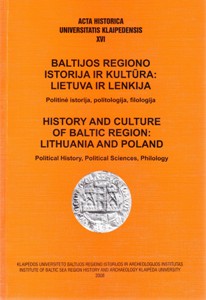Volume 16 (2008): Baltijos regiono istorija ir kultūra: Lietuva ir Lenkija. Politinė istorija, politologija, filologija = History and Culture of Baltic Region: Lithuania and Poland. Political History, Political Sciences, Philology, January 2008

Order by:
Pub. online: 15 Jan 2008
Type: Article
 Open Access
Open Access
Journal:
Acta Historica Universitatis Klaipedensis
Volume 16 (2008): Baltijos regiono istorija ir kultūra: Lietuva ir Lenkija. Politinė istorija, politologija, filologija = History and Culture of Baltic Region: Lithuania and Poland. Political History, Political Sciences, Philology, pp. 89–96
Abstract
Pub. online: 15 Jan 2008
Type: Article
 Open Access
Open Access
Journal:
Acta Historica Universitatis Klaipedensis
Volume 16 (2008): Baltijos regiono istorija ir kultūra: Lietuva ir Lenkija. Politinė istorija, politologija, filologija = History and Culture of Baltic Region: Lithuania and Poland. Political History, Political Sciences, Philology, pp. 97–111
Abstract
Pub. online: 15 Jan 2008
Type: Article
 Open Access
Open Access
Journal:
Acta Historica Universitatis Klaipedensis
Volume 16 (2008): Baltijos regiono istorija ir kultūra: Lietuva ir Lenkija. Politinė istorija, politologija, filologija = History and Culture of Baltic Region: Lithuania and Poland. Political History, Political Sciences, Philology, pp. 113–121
Abstract
Pub. online: 15 Jan 2008
Type: Article
 Open Access
Open Access
Journal:
Acta Historica Universitatis Klaipedensis
Volume 16 (2008): Baltijos regiono istorija ir kultūra: Lietuva ir Lenkija. Politinė istorija, politologija, filologija = History and Culture of Baltic Region: Lithuania and Poland. Political History, Political Sciences, Philology, pp. 123–133
Abstract
Pub. online: 15 Jan 2008
Type: Article
 Open Access
Open Access
Journal:
Acta Historica Universitatis Klaipedensis
Volume 16 (2008): Baltijos regiono istorija ir kultūra: Lietuva ir Lenkija. Politinė istorija, politologija, filologija = History and Culture of Baltic Region: Lithuania and Poland. Political History, Political Sciences, Philology, pp. 135–148
Abstract
Pub. online: 15 Jan 2008
Type: Article
 Open Access
Open Access
Journal:
Acta Historica Universitatis Klaipedensis
Volume 16 (2008): Baltijos regiono istorija ir kultūra: Lietuva ir Lenkija. Politinė istorija, politologija, filologija = History and Culture of Baltic Region: Lithuania and Poland. Political History, Political Sciences, Philology, pp. 149–158
Abstract
Pub. online: 15 Jan 2008
Type: Article
 Open Access
Open Access
Journal:
Acta Historica Universitatis Klaipedensis
Volume 16 (2008): Baltijos regiono istorija ir kultūra: Lietuva ir Lenkija. Politinė istorija, politologija, filologija = History and Culture of Baltic Region: Lithuania and Poland. Political History, Political Sciences, Philology, pp. 159–164
Abstract
Pub. online: 15 Jan 2008
Type: Article
 Open Access
Open Access
Journal:
Acta Historica Universitatis Klaipedensis
Volume 16 (2008): Baltijos regiono istorija ir kultūra: Lietuva ir Lenkija. Politinė istorija, politologija, filologija = History and Culture of Baltic Region: Lithuania and Poland. Political History, Political Sciences, Philology, pp. 165–178
Abstract
Pub. online: 15 Jan 2008
Type: Article
 Open Access
Open Access
Journal:
Acta Historica Universitatis Klaipedensis
Volume 16 (2008): Baltijos regiono istorija ir kultūra: Lietuva ir Lenkija. Politinė istorija, politologija, filologija = History and Culture of Baltic Region: Lithuania and Poland. Political History, Political Sciences, Philology, pp. 179–187
Abstract
Pub. online: 15 Jan 2008
Type: Article
 Open Access
Open Access
Journal:
Acta Historica Universitatis Klaipedensis
Volume 16 (2008): Baltijos regiono istorija ir kultūra: Lietuva ir Lenkija. Politinė istorija, politologija, filologija = History and Culture of Baltic Region: Lithuania and Poland. Political History, Political Sciences, Philology, pp. 189–199
Abstract